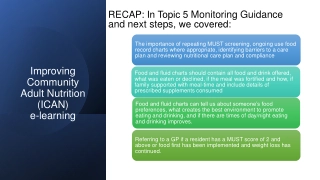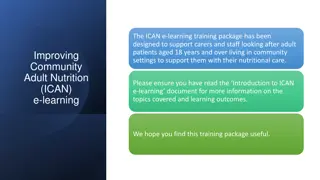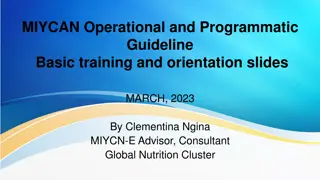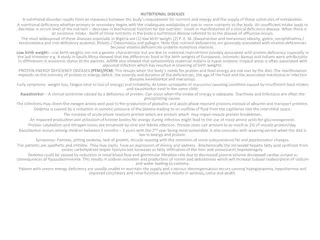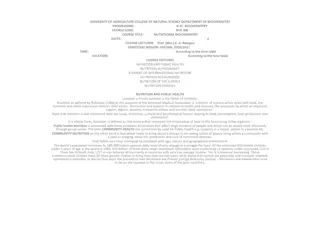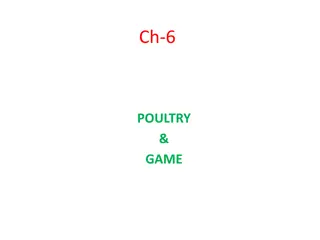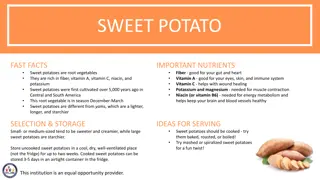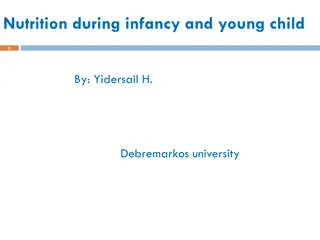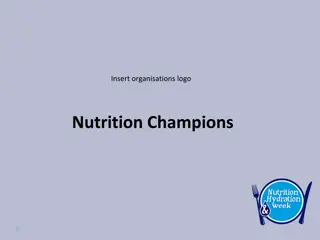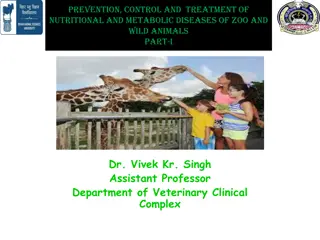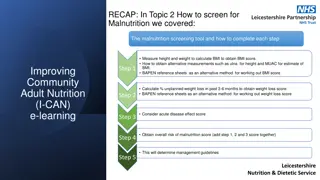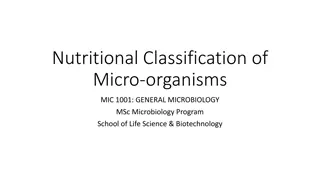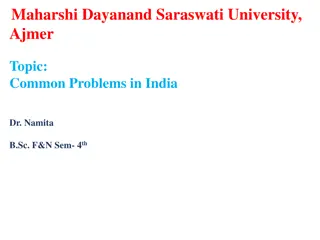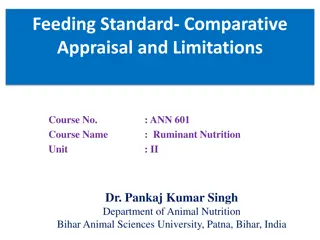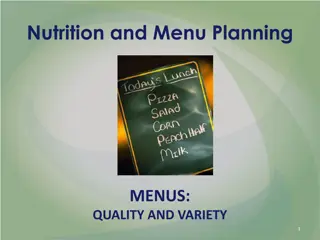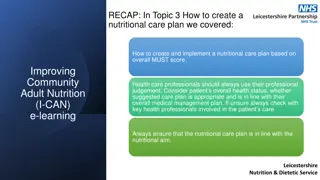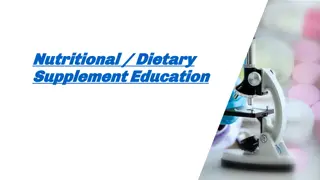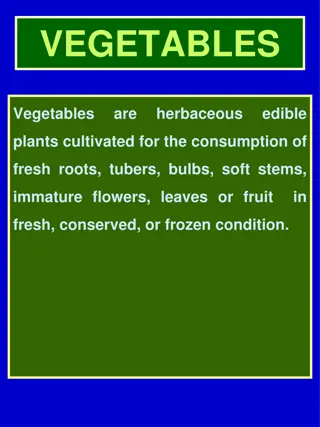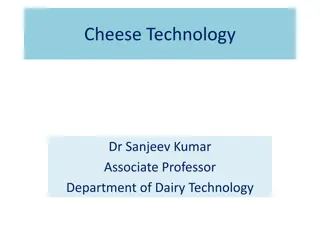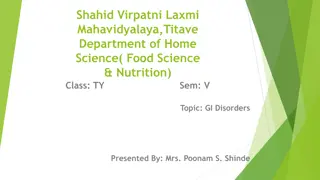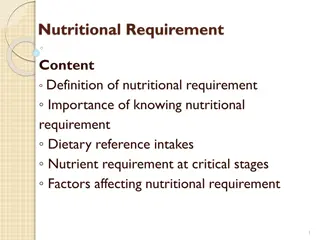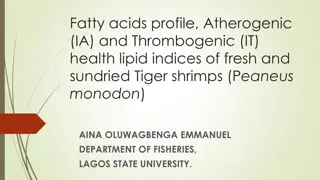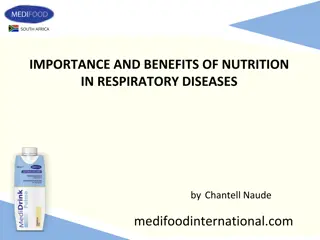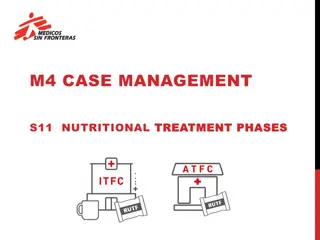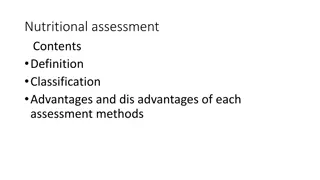Importance of Monitoring Guidance in Nutritional Care
This recap covers the significance of regular screening, using food record charts, identifying barriers to care plans, and reviewing nutritional compliance. It emphasizes the ICAN e-learning module and the key factors influencing nutritional care. The content highlights the importance of adequate fl
0 views • 16 slides
Strategies for Managing Malnutrition with Nutritional Care Plans
Understanding how to create and implement a nutritional care plan based on the MUST score, including strategies like Food First and Fortification, can help manage malnutrition effectively. This involves utilizing nutrient-dense foods, promoting wound healing, increasing muscle strength, and improvin
0 views • 18 slides
Nutritional Care Planning for Malnutrition Screening
Learn how to screen for malnutrition using tools like BMI calculation and weight loss assessment. Understand the steps to create a nutritional care plan based on MUST scores, including setting aims, implementing agreed plans, and monitoring progress. Gain insights into managing malnutrition risks an
1 views • 12 slides
Exploring the Health Benefits and Nutritional Value of Crunchy Almond Butter
Crunchy almond butter has emerged as a popular and nutritious alternative to traditional spreads. Made from ground almonds, this creamy yet textured delight offers a myriad of health benefits and is a versatile addition to any diet. In this blog post, we delve into the nutritional profile and explor
0 views • 4 slides
Supporting Adult Nutrition in Community Settings - ICAN E-Learning Training
The ICAN E-Learning Training Package is designed to assist carers and staff caring for adult patients aged 18 and over in community settings with their nutritional care. The training covers topics such as national standards in nutrition, defining malnutrition, causes and consequences of malnutrition
7 views • 10 slides
Multidisciplinary Approach to Bariatric Surgery: Case Study and Interventions
This case study involves a patient with severe obesity and comorbidities preparing for bariatric surgery. The medical history includes type 2 diabetes and significant obstructive sleep apnea, leading to a reduced quality of life. The patient's psychosocial assessment highlights the importance of psy
4 views • 7 slides
Improving Maternal and Child Nutrition in Somalia: Challenges and Solutions
Addressing the nutritional challenges faced by women and children in Somalia, including high rates of anemia, inadequate breastfeeding practices, and malnutrition. Factors contributing to malnutrition such as poor diets, limited access to essential services, and gender inequalities are highlighted.
0 views • 12 slides
Germany Nutritional Supplements Market
The Germany Nutritional Supplements Market Size is Anticipated to Exceed USD 9.66 Billion by 2033, growing at a CAGR of 6.55% from 2023 to 2033.
0 views • 4 slides
Overview of Nutritional Diseases and Disorders
Nutritional diseases arise from imbalances between the body's nutrient and energy requirements and their supply. Nutritional deficiencies can lead to clinical diseases, while excessive intake can result in diseases of affluence. Common nutritional disorders include low birth weight, PEM, obesity, go
4 views • 6 slides
Understanding Nutritional Biochemistry: A Comprehensive Overview of Nutrition and Public Health
Nutrition, as defined by Robinson, explores the relationship between food and the human body's functioning. This course delves into key topics such as nutrition in pregnancy, childhood, and the elderly, as well as nutrition-related diseases. It emphasizes the importance of public health nutrition in
1 views • 7 slides
Understanding Poultry and Game: Types, Cooking Tips, and Nutritional Benefits
Poultry, including chicken, turkey, duck, goose, and guinea fowl, offers a leaner option compared to other meats, making it a healthy choice for various dishes. Game meat, sourced from animals hunted for food, provides a unique flavor profile and nutritional benefits. This article delves into the ty
0 views • 16 slides
Discover the Nutritional Benefits of Sweet Potatoes and Fun Activities to Explore
Explore the nutritional value of sweet potatoes, including fiber, vitamins, and minerals they offer. Learn interesting facts about their cultivation and ideal serving suggestions. Engage in exciting activities like a five senses exploration, poetry writing, and recipe invention centered around sweet
5 views • 5 slides
Infant Nutrition and Growth Development Overview
This informative content covers various aspects of infant nutrition and growth development, including breastfeeding, complementary feeding, and common nutritional problems. It also discusses assignments related to assessing nutritional status, harmful traditional practices, and the importance of neo
3 views • 61 slides
Nutrition Champions: Improving Nutritional Care in Health and Social Settings
Nutrition Champions play a vital role in promoting food and drink as essential components of care packages in various settings. Their goal is to enhance nutritional and hydration care, share best practices, facilitate behavior change, and improve access to healthy food and fluids. The content discus
1 views • 21 slides
Managing Nutritional and Metabolic Diseases in Zoo and Wild Animals
The prevention, control, and treatment of nutritional and metabolic diseases in zoo and wild animals are essential for maintaining their health. These diseases, such as rickets, osteoporosis, osteomalacia, and fibrous osteodystrophy, can result from imbalances in dietary nutrients and metabolic dera
0 views • 10 slides
Understanding Malnutrition Screening and Nutritional Care Planning
In this overview, discover the process of screening for malnutrition, including calculating BMI, assessing weight loss, and determining overall malnutrition risk. Explore how to create a nutritional care plan based on the MUST score and set appropriate nutritional aims for patients.
0 views • 12 slides
Nutritional Classification of Microorganisms in General Microbiology
Microorganisms are classified based on their nutritional requirements into autotrophs and heterotrophs. Autotrophs can utilize inorganic nutrients or light for energy, while heterotrophs require organic compounds. They are further categorized into four groups: photoautotrophs, photoheterotrophs, che
1 views • 5 slides
Nutritional Challenges in India: A Comprehensive Overview
India faces various nutritional problems, including protein-energy malnutrition, vitamin deficiencies, and macronutrient issues. The population struggles with common ailments like anemia, heart diseases, and obesity due to micronutrient deficiencies. Understanding and addressing these challenges are
0 views • 17 slides
Enhancing Nutritional Security in SADC Communities through Sugar Fortification
Nutritional security is crucial for overall well-being, and this presentation explores the significant role of sugar fortification in improving micronutrient intake and combating malnutrition in SADC regions. Insights into the current status quo, strategies for enhancing micronutrient intake, and th
0 views • 15 slides
Understanding Feeding Standards in Ruminant Nutrition
Feeding standards play a crucial role in determining the nutritional needs of animals for optimal health and productivity. They consider factors like productivity, product composition, and physiological conditions, guiding effective nutritional management. Despite their usefulness, feeding standards
0 views • 8 slides
Explore the World of Pasta: Shapes, Origins, and Nutritional Value
Delve into the fascinating world of pasta with this comprehensive guide covering the main pasta shapes, the intriguing origins of pasta, how to prepare fresh pasta, and the nutritional value of this beloved staple. From classic spaghetti to unique varieties like bucatini and conchiglie, discover the
0 views • 22 slides
Nutritional Guidance for Children with Health Challenges
This presentation by Maria Raspolic, MS, RD discusses common nutritional issues in children with health challenges, providing recommendations to address these issues and exploring the use of the ketogenic diet for seizure management. Topics cover poor growth, dehydration, constipation, inadequate nu
0 views • 29 slides
Promoting Nutritional Quality in Menus for Children
Enhance the nutritional quality of menus for children by incorporating more whole grains, fruits, and vegetables while reducing juice intake. By offering a variety of healthy options, such as whole grain bread, colorful fruits, and different vegetables, you can help prevent childhood obesity and pro
0 views • 36 slides
Nutritional Recommendations for Type 2 Diabetes Management
Regularity and consistency in diet are crucial for individuals with type 2 diabetes to maintain stable blood sugar levels. The new nutritional pyramid recommended by the Ministry of Health of the Republic of Lithuania emphasizes the importance of balanced nutritional choices for managing diabetes. N
0 views • 15 slides
Managing Malnutrition: Strategies and Nutritional Care Plans
Learn how to create and implement a nutritional care plan based on the MUST score, in line with the I-CAN approach for treating malnutrition. Discover the importance of Food First and Fortification strategies, including tips for increasing food intake and promoting overall health and wellbeing.
0 views • 18 slides
Understanding Dairy Cattle Feeding: Terms, Nutritional Areas, and Advantages
Learn about important terms like hay, silage, and pre-mix, nutritional areas to balance in a dairy ration, advantages of pastures for feed, and disadvantages to consider. Discover how feeding hay can provide cost-effective nutrients and support proper digestion and rumen function.
0 views • 34 slides
NCAA Drug Testing Program and Nutritional Supplement Education
The NCAA emphasizes a food-first approach and cautions against the use of nutritional or dietary supplements due to the risk of contamination with banned substances. Student-athletes are advised to consult designated individuals before using any supplements as they may not be well-regulated. The NCA
0 views • 7 slides
Comprehensive Guide to Nutritional Value and Composition of Vegetables
Vegetables are herbaceous edible plants cultivated for consumption in various forms like fresh, cooked, or as salads. They are rich in essential nutrients such as protein, carbohydrates, vitamins, and inorganic salts. The tables provided detail the main nutrient constituents and composition of vario
1 views • 25 slides
Understanding Cheese: Technology, Classification, Legal Standards, and Nutritional Value
Dive into the world of cheese with insights on its technology, definitions, classification, legal standards, and nutritional composition. Discover how cheese is made, categorized, regulated, and its key nutritional components.
0 views • 16 slides
Enlightening Future on Nutritional Values of Edible Insects for Health
Edible insects are a valuable protein source with potential health benefits and economic advantages. This research explores the nutritional value of edible insects, their role as an alternative food source, and their impact on human health. Findings highlight the importance of promoting the consumpt
0 views • 14 slides
Optimizing Nutritional Support for Upper GI Cancer Patients: Insights and Strategies
High prevalence of malnutrition in upper GI cancer patients highlights the importance of early nutritional screening and intervention. The role of prehab clinics in enhancing outcomes is gaining momentum. Insights from previous experience in nutritional screening reveal both advantages and challenge
2 views • 15 slides
Understanding Peptic Ulcers: Causes, Symptoms, and Nutritional Management
Shahid Virpatni Laxmi Mahavidyalaya conducted a presentation on gastrointestinal (GI) disorders, focusing on peptic ulcers. The content covers the etiology, symptoms, and nutritional management of peptic ulcers, emphasizing the importance of proper diet in managing this condition. Peptic ulcers, cha
0 views • 8 slides
Understanding Nutritional Requirements and Their Impact
Exploring the definition and importance of nutritional requirements, as well as the Dietary Reference Intakes, critical stages for nutrient needs, and factors influencing nutritional requirements.
0 views • 174 slides
Fatty Acids Profile and Health Lipid Indices of Tiger Shrimps
Seafood lipids, including Tiger shrimps like Peaneus monodon, are rich in essential fatty acids such as EPA, DHA, and AA. This study focuses on the fatty acids profile, atherogenic (IA), and thrombogenic (IT) health lipid indices of fresh and sundried Tiger shrimps, shedding light on the effects of
0 views • 19 slides
Importance and Benefits of Nutrition in Respiratory Diseases
Nutrition plays a crucial role in respiratory diseases such as COPD and CF, with malnutrition affecting a significant percentage of patients. Poor nutritional status is linked to increased morbidity and mortality in these patients, impacting pulmonary health and muscle function. MediDrink Pulmo offe
0 views • 7 slides
Improving Patient Outcomes through Frailty Support Project
This project, funded by the Carmarthenshire Intermediate Care Fund, aimed to provide flexible, person-centered care to support patient mobility and nutritional needs. Frailty workers implemented various strategies such as frailty snack boxes, daily frailty logs, grip strength assessments, and nutrit
0 views • 8 slides
Understanding Nutritional Treatment Phases in Pediatric Malnutrition
This session covers the different phases of nutritional treatment in pediatric malnutrition programs, focusing on objectives, specifics, and criteria for transitioning between phases. An illustrative case of Annika, a 3-year-old in the Transition Phase, is provided for practical application and unde
0 views • 5 slides
Neonatal Nutrition: Growth, Nutritional Support, and Management Phases
Neonatal nutrition, specifically focusing on growth faltering and early nutritional support, is crucial for the well-being of premature infants. Understanding growth rates and providing appropriate nutrients are key goals. Target growth rates and reference growth curves are important considerations.
0 views • 28 slides
Understanding Nutritional Assessment Methods
Nutritional assessment involves evaluating the nutritional status of individuals through various methods such as anthropometry, biophysical assessments, clinical evaluations, and dietary analysis. Anthropometric measurements, such as weight and recumbent length, play a crucial role in assessing grow
0 views • 48 slides
Understanding Food and Nutritional Toxicology
Food and nutritional toxicology delve into the science of poisons, toxins, and toxicants found in food. It covers substances harmful to consumers, including natural toxicants, contaminants, and additives. Nutritional toxicology focuses on the overlap between nutrition and toxicology, exploring the i
0 views • 17 slides
